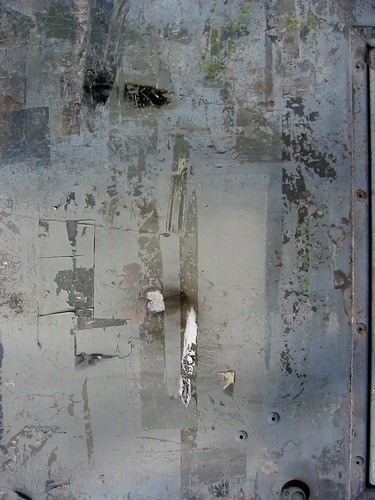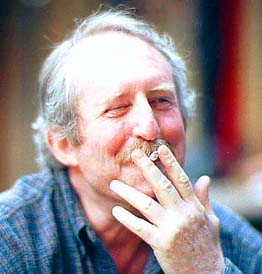
Thicket and Fringe
Coursing the southeastern Michigan freeways—passing one boxy block of offices after another, the lamely landscaped kind found in “research parks,” nearly all with signage recent and intact—things like “Metaldyne,” “Omnisysmatics,” “Dynosync,” (they could house anything), all post’d “For Sale” or “For Lease,” sign, one suspects, of the trickle-down effect of the automotive industry’s NAFTA-inspired cold shoulder to the region—into one of the tonier suburbs of Detroit Saturday, the incongruously-named Beverly Hills, where’s found one Detroit County Day School. There for a performance by violinist Gil Shaham and pianist Akira Eguchi, playing Mozart’s Mannheim sonatas, K.301-306, under the patronage of the Chamber Music Society of Detroit. Shaham and Eguchi clearly in dynosync, enjoying making music together, Shaham a slender wisp of a man (one thinks clothes must always look too big on him—at one point, during a rather extend’d piece of piano, he seem’d to collapse a little, shrinking down into a Beckettesque character, perplex’d, lost, defeated, huddled in), Eguchi seemingly unbudgeable, a solid unflagging presence at the piano, though probably the shyer of the two. Shaham’s eyes move constantly, traces of smiles and grimaces come and go, occasional tiny violent shudders, caught between anticipatory glee and a shudder against the grandeur confront’d, lead to a fierce bow attack. Terrific to watch music itself stir a man so unremittingly.
And then, Mozart being Mozart, that is, essentially frivolous, essentially an entertainment (that distend’d rot courtliness of powder’d men precisely beauty-mark’d and ringlet’d ladies with pinch’d off waists, art in full-blood’d service to a royal elite is never far off) my brainbox, that tiny stage, began to, well, entertain other notions there in the smallish auditorium of the Detroit County Day School, with its parking attendants in yellow slickers with electronic flares, portably orange, its Lincolns and Buicks, its trotlines and drop-off circle for a matron society. And looking about, one is overwhelm’d by the crowd, its pure whiteness, its age (precariously “hoist’d”), its obvious richesse, its self-safisfy’d readiness for art in its guise of empty spectacle, a canned consumable with no rough edges. The single bouquet at the long Lincoln-mimicking high-sheen reach of the grand piano is impeccable. These are, one supposes, remnants of the executive class that’s long inhabit’d the suburbs of Detroit, not the newer white flight (professional-classes on down), but the old school. (Prefatory remarks by a man with a shock of white hair and the demeanor of a fraternity brother—perpetual boyish smirk at being on stage—representing something call’d Comerica Wealth & Institutional Management, a “sponsor,” being precisely the outfit that recently announced it’d be moving its headquarters to Texas, hauling its financial ass out of the trouble-spot that is Michigan.)
In the Green Room post-concert, gain’d entirely licitly (note to usher to Shaham, usher returning with a thumbs up, long story) after traversing an area that seem’d to lead to a loading dock, one encounters Mr. Boyish Smirk (ignored), lots of champagne (triggering powerful thirst), and two matrons who eye with obvious disapproval one’s jeans and jersey quotidian-invisibility-costume, with smudge-color’d anorak puffy in the surround. Bustily manoeuvring they corner’d me, patiently waiting to greet Shaham, with the inevitable mock-innocence covering threat of low-level violence: “Can we help you?” If only, dear reader, I’d had the wherewithal to ask for “one of those tall flutes of champagne there.” No, I bow’d to my explanatory tale in all earnestness and they had to put up with my malign (unsightly) presence in the room.
—
Variation on a Line by Emily Dickinson
Remembrance enters through the back
Door, unclarify’d and abrupt. It
Shakes itself off like a
Dog and tracks the linoleum.
Entirely of the moment, it
Cancels all other plans, impertinent
And slobbering in its need.
Out in the front yard
A pliable whippet launches into
A pitiable howl. It drags
Its chain through spring run-
Off mud, clanking against bone-
Ends bury’d all winter. It,
Too, wants inside, to rub
Its concert’d individual self against
The newel posts of an
Ascent, or an assent. Yes,
And doggedly, I admit it:
A whole canine clan’s corner’d
My thinking, there’s no telling
What pack one’ll run up
Against in the stray metaphorical
Night. I’d better mop those
Paw prints off the floor.
—
Sign, instantly decipher’d, of a weekend fraught with the usual tearings off omnidirectional. A hoot in the making, and a bitch to reconstruct. Or maybe the result of desultory ambivalent readings out of a chaos of books—Mark Kurlansky’s The Basque History of the World’s the one I keep keeping to—though Paul LaFarge’s Haussmann, or The Distinction put in a valiant bid for attention, too. Such choice flailings rarely say anything about the particular volumes in hand, it’s something mischievous, intemperate, willful, perverse: a sudden revulsion to the very words one is reading. Then, last night late, I hoist’d up the Robert Duncan / Denise Levertov letters and, supine, balancing it against my sternum, thought I could probably remain like that through its completion, such was my sudden readiness for Duncan’s particular way of keeping thought liquid, waterlogged, swole up, und so weiter. (One is shy about predicting a forthcoming intensity, one’s found oneself out in midstream stuck in a book whilst the frolics go down in the tributary waters, yes one’s found oneself . . .)













-D.jpg)


















